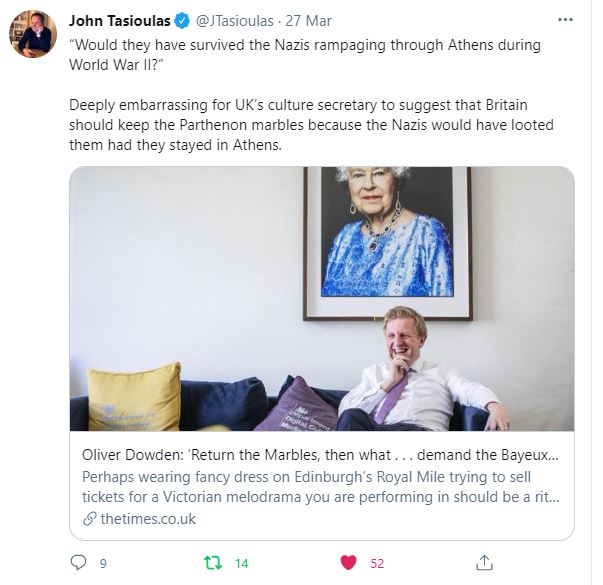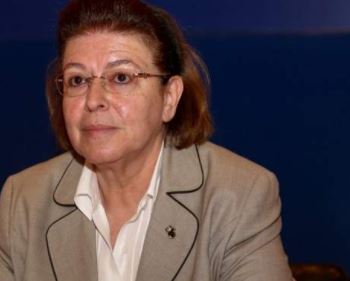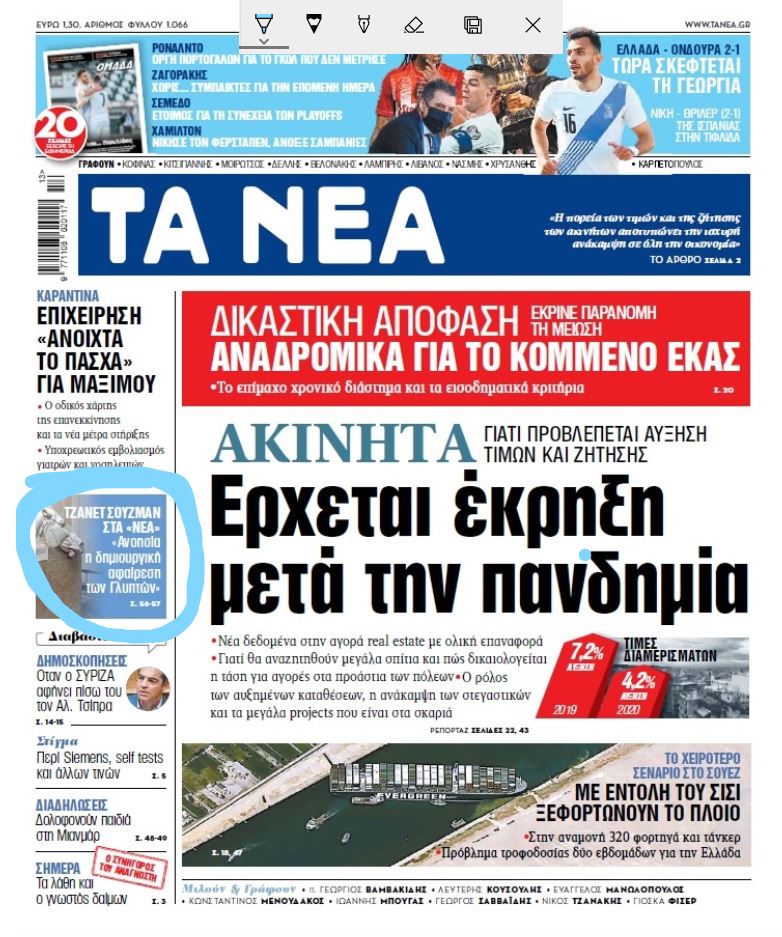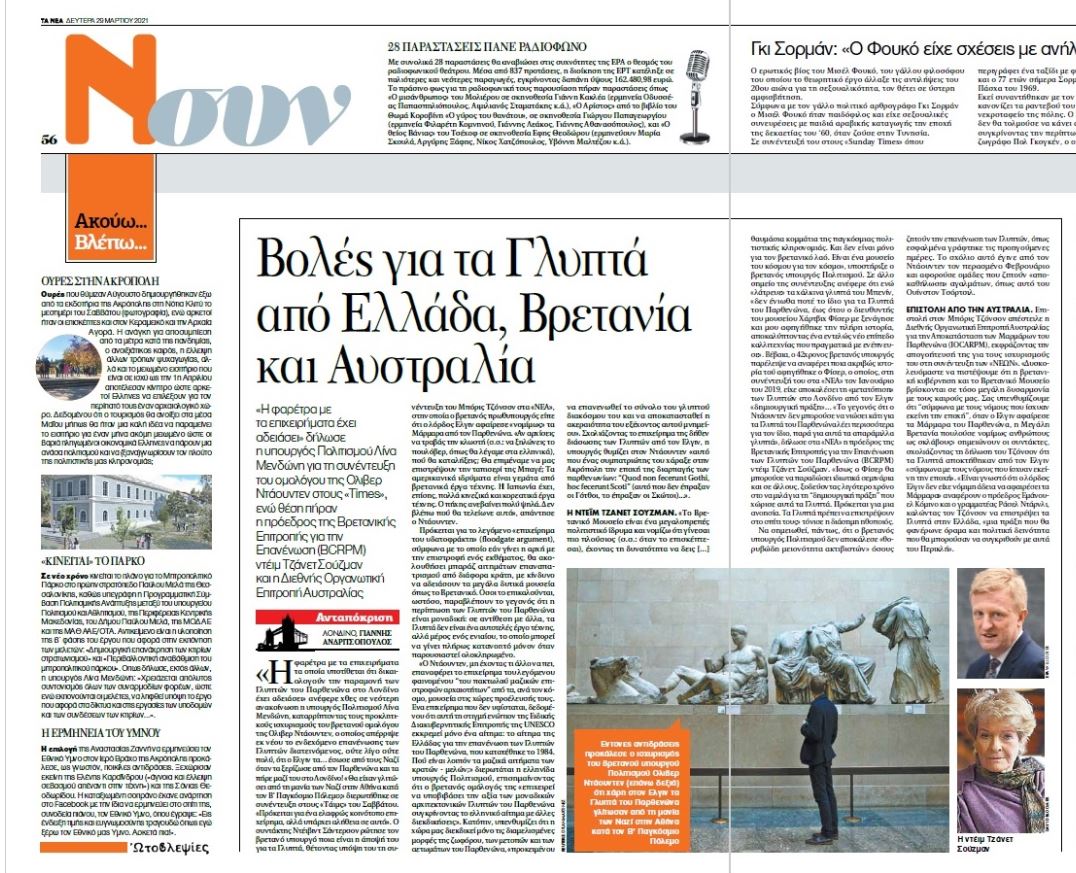In The Times on Saturday 27 March 2021, Oliver Dowden, was interviewed by David Sanderson, Arts Correspondent. In the interview Oliver Dowden was keen for the cultural world to reopen and shares similar views with Prime Minister Johnson with regards to the cultural treasures held by British Museums such as the 'Elgin' Marbles and Benin Bronzes. Johnson told Greek newspaper, Ta Nea, this month that the government’s “firm longstanding position on the [Parthenon] sculptures is that they were legally acquired by Lord Elgin under the appropriate laws of the time."
Dowden is quoted as adding: “Once you start pulling on this thread where do you actually end up? Would we insist on having the Bayeux Tapestry back? American institutions are packed full of British artefacts. Japan has loads of Chinese and Korean artefacts. There is an exceptionally high bar for this . . . because I just don’t see where it ends. You go down a rabbit hole and tie up our institutions. I think it is just impossible to go back and disentangle all these things."
Dowden said that while he loved the Benin Bronzes, he had “never related that much to the Parthenon Sculptures” until the museum’s director, Hartwig Fischer, “showed me around and told me the story in wonderful depth, revealing a whole different level of the artistry which I found really inspiring”. He added: “Would they have survived the Nazis rampaging through Athens during World War II. It is a slightly trite argument but there is a truth. Would the Benin Bronzes have survived various international conflicts?”
To read the full article, kindly visit The Times link here.
Oliver Dowden's remarks sparked reactions from BCRPM's members, although many also felt that the Minister's comments were so poorly thought out it would be best not to comment at all. BCRPM member, Professor John Tasioulas, took to Twitter:

Further to the article in The Times on Saturday with Oliver Dowden, Greek Minister of Clture and Sport, Dr Lina Mendoni’s statement can be read below:
"Yesterday's statements by the British Secretary of State for Digital, Culture, Media and Sport, Oliver Dowden underline the fact that the arguments used to justify the retention of the Parthenon Sculptures in London, are threadbare. Dowden, having nothing else to say, revives the argument of the so-called phenomenon of "the floodgates for mass returns of antiquities" from Museums around the world to their countries of origin. This is a non-existent argument, given that only one request is pending before UNESCO's Special Intergovernmental Committee at the moment: Greece's request for the reunification of the Parthenon Sculptures, tabled in 1984. So where are the massive demands of the Member States?
The British Minister of Culture is attempting to downplay the value of the Parthenon's unique architectural sculptures by comparing the Greek request with other claims. Greece claims only the dismembered forms of the frieze, the metopes and the pediments of the monument - a symbol of Western civilization - which were violently removed from the monument and the land of their birth. Greece claims only the Parthenon Sculptures in order to reunite entirety the surviving sculptural components of the Parthenon, therby restoring the integrity of this outstanding monument.
As for the argument that Elgin supposedly rescued the Sculptures – since they could have been destroyed by others, if they had not been stolen by the noble Lord – we will remind Mr. Dowden of what one of his compatriots carved on the Acropolis at the time of the violent theft: "quod non fecerunt Gothi, hoc fecerunt Scoti" (what the Goths did not do, the Scots did )..."

In today's Ta Nea, UK Correspondent Yannis Andritsopoulos, writes that the response from Minister Mendoni to Oliver Dowden was baked by Janet Suzman, Chair of BCRPM and at the same time a letter has been sent to Prime Minister Johnsonby IOCARPM (the first Committee to be founded for the campaign to reunite the Parthenon Marbles), members of the International Association. The letter signed by Founder and Chair Emanuel John Comino and Secretary, Russell Darnley, can also be read in full here.
Janet's full statement:
"That Dowden could not relate to the Parthenon Marbles says more about Dowden than it does about these peerless sculptures. He should consider himself lucky to have had a private tutorial from Dr Fischer. Perhaps Fischer could oblige with personal tutorials for everyone and spend less time spouting truisms about the ‘creative act’ that separates these figures from their peers in Athens and which is nothing more than self-justifying piffle. It is not a creative act to have them apart, it is the opposite, and two hundred years of separation is enough. They have done their job by now, of inspiring the Western world and should go home, where context will give them what is sadly lacking in the grey of Bloomsbury."
To read the Ta Nea article on line, please visit https://www.tanea.gr/print/2021/03/29/lifearts/voles-gia-ta-glypta-apo-ellada-vretania-kai-aystralia/

